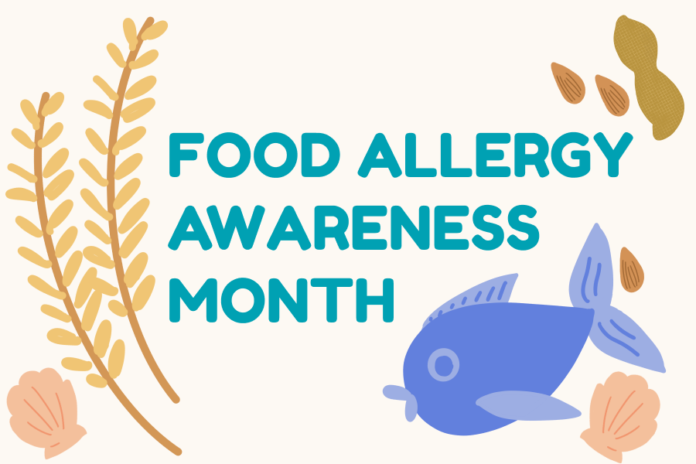Students describe dining common accommodations and offer advice for how peers can support friends with food allergies
By SONORA SLATER — science@theaggie.org
May is Food Allergy Awareness Month, which recognizes a condition that affects around 6-8% of adults in the U.S. and ranges from causing mild hives and itchiness to life-threatening reactions, according to a recent press release from UC Davis Health.
If you’ve ever contemplated how your dairy-free roommate lives without cheese, or struggled to remember not to bring a peanut butter and jelly sandwich to lunch with your friend, this might be a chance to learn about how you can support them.
UC Davis students with food allergies talked about their experience so far at college, especially when they were freshmen eating at the dining commons (DCs).
Melinda Ma, a third-year animal science major with a dairy allergy, said that it was sometimes difficult to find options at the DCs.
“I’m very grateful that [Segundo] was pretty consistent with labeling the allergens so I didn’t have to worry about accidentally eating dairy,” Ma said over text. “But some days there weren’t that many options for me except the salad bar or one soup and the vegan option that wasn’t always great.”
Alex Chang, a third-year biological sciences major who is allergic to dairy, seafood and peanuts, said that he was pleasantly surprised by the availability of allergy-friendly dishes at the DCs, although the options were still somewhat limited.
“When I went to the Tercero DC, my diet consisted of burgers, salads, Mongolian wok, soups, and vegan cookies,” Chang said over text. “They also usually had some sort of meat dish either at the Pacific Fusion or the Bistro.”
The staff was very accommodating and helpful if they had specific requests, such as removing cheese from burgers, removing a sauce that contained dairy or asking for dairy-free ice cream, according to both Ma and Chang.
“There was never a day that I went to the DC where I could not find something to eat,” Chang said. “Although, sometimes when my friends got salmon or cheesy pasta, the smell was so overwhelmingly good that I was jealous that I couldn’t eat it.”
Dietary accommodations for food allergies are only available in the Residential Dining Commons — Segundo, Tercero and Cuarto — which does not include Latitude. Student Housing and Dining Services was contacted for comment but did not respond as of May 23.
Latitude features cultural cuisine from around the world and attempts to accurately represent authentic culinary traditions, according to the website. Because of this, the dishes served may contain major food allergens, which is why dietary accommodations through the Dietary Support Program are not offered at Latitude.
Chang said that he did find it hard to eat at Latitude due to a lack of variety.
“Almost every single dish there had either seafood or some kind of dairy, either mixed into the dish or baked into it, so it was impossible for the staff to serve it dairy-free,” Chang said. “On most days, the only thing that I was able to eat was the shawarma. My friends kept on going to [Latitude] to try out all the exotic dishes, but I quickly tired of the shawarma and returned back to the comfort of Tercero DC.”
Daily menus for each DC are published online in order to help students know what is being offered, according to the Student Housing website. These are resources that Chang said he regularly took advantage of.
“I would check both menus online to see what kind of foods that they had to offer, and would choose my dining common accordingly,” Chang said. “There were the rare days that Latitude served ramen or steak, both of which were allergen free, and I was always the first of my friends to know about it.”
All dishes in the DCs are also labeled for wheat, gluten, soy, dairy, shellfish, eggs, tree nuts, peanuts, sesame and coconut. Allergy-friendly options in each DC are available at the Bistro, where a variety of dishes without any major allergens can be found. However, the DCs are not certified allergy-free or gluten-free facilities since other dishes served may contain major allergens, according to the Student Housing website.
Chang said that while he did know about the daily online menus for the DCs, he wishes he had known about some of the other resources available to UC Davis students with food allergies.
“I […] recently learned of the ‘Food Allergy and Dietary Accommodations’ page on the Student Housing and Dining Services Website, which detailed all the information and accommodations that the dining commons and other on campus food offerings would make,” Chang said. “I wish that I discovered this page sooner, as there were many options that I was not aware of in my freshman year.”
Apart from the accommodations the university offers, there are also ways that students can help support their peers who have food allergies. In a recent press release from UC Davis Health, pediatric allergist and immunologist Victoria Dimitriades suggested some tips to help those with food allergies.
These include taking the time to learn what your friend is allergic to, reading labels, washing your hands to reduce cross-contamination, disclosing allergens in cooked food and knowing what to do if your friend is exposed to allergens.
Ma offered some advice of her own to students wanting to support their friends in this way.
“We feel very loved when you remember and check in with us about food options,” Ma said. “But no worries if you forget [because] we can always make do with the options we have. And no need to feel bad or feel like you are restricted to not eat what we are allergic to in front of us, unless it’s a severe nut allergy or something. […] We want you to enjoy what we can’t eat.”
Written by: Sonora Slater — science@theaggie.org









